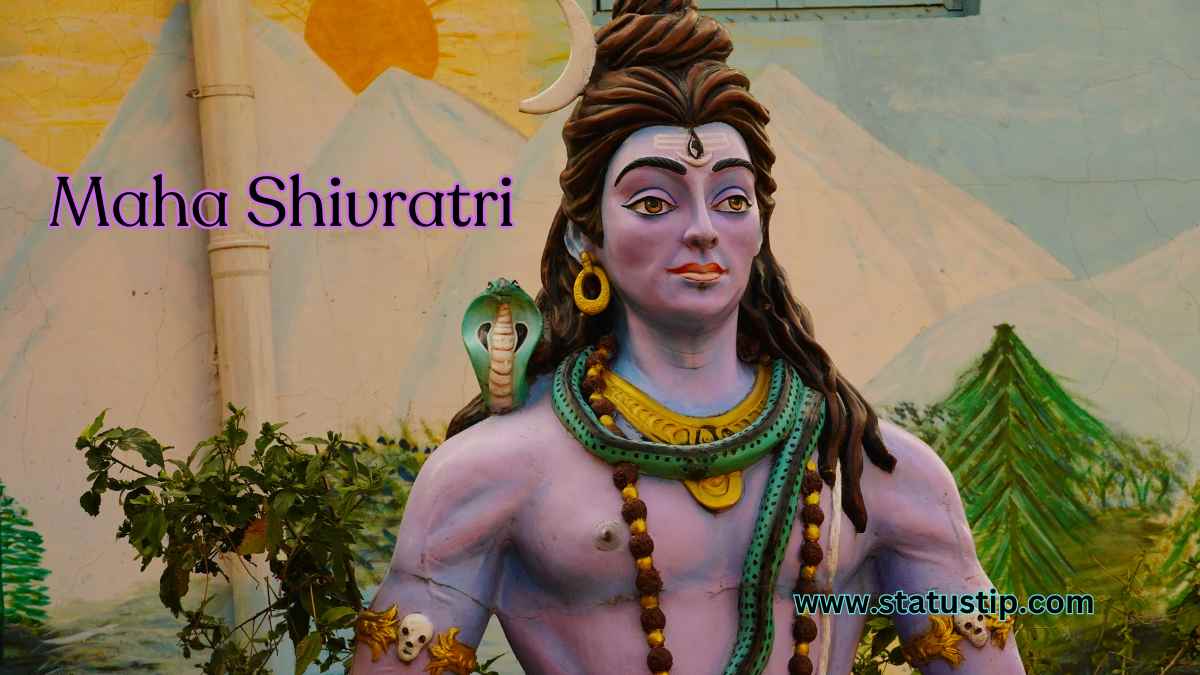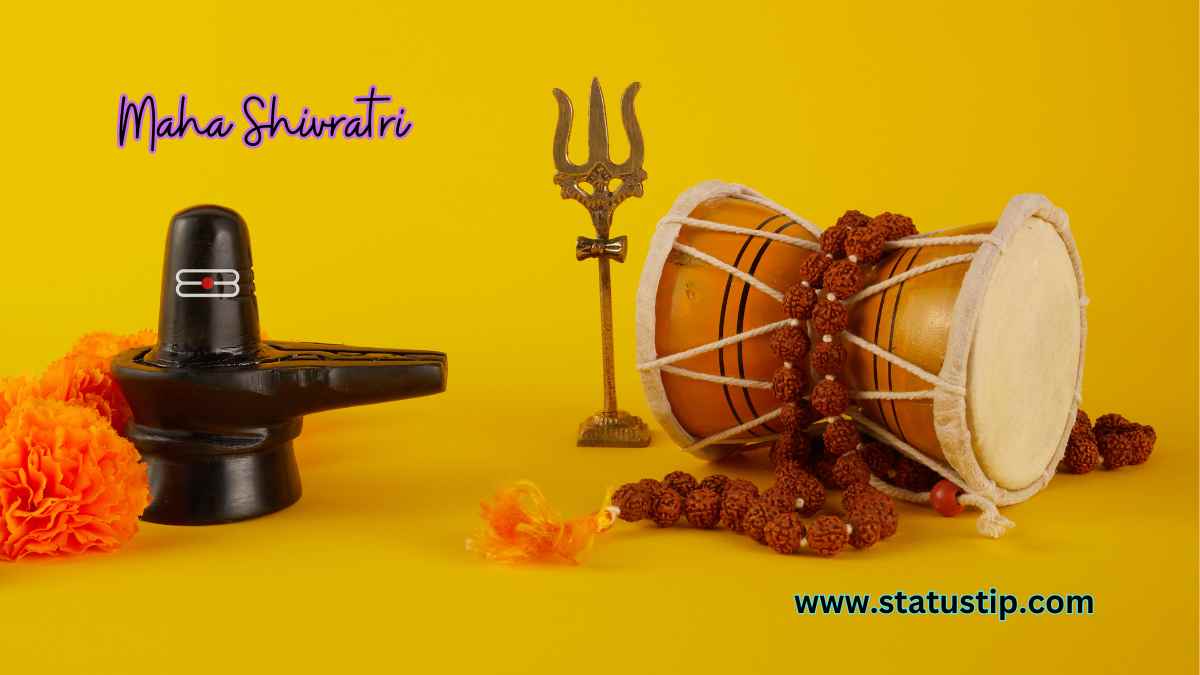Understanding the Significance of Maha Shivratri in Hindu Mythology
Maha Shivratri, Lord Shiva festival, Shiva ratri puja, Hindu mythology, significance of Happy Shivratri
Maha Shivratri, one of the most auspicious festivals in Hindu mythology, holds profound significance and reverence among devotees worldwide. This sacred occasion is dedicated to Lord Shiva, the supreme deity known as the destroyer of evil and the transformer of creation.
On Maha Shiv, which translates to “The Great Night of Shiva,” worshippers observe fasts, offer prayers, and perform rituals to seek blessings for strength, wisdom, and liberation from worldly desires. It is believed that on this night, Lord Shiva performed his divine cosmic dance known as the Tandava.
Devotees stay awake throughout the night chanting prayers and hymns in honor of Lord Shiva. The festival symbolizes overcoming darkness and ignorance through devotion and self-discipline.
Maha Shivratri is also associated with various mythological tales that depict the power and compassion of Lord Shiva. It is a time for spiritual introspection, seeking forgiveness for past mistakes, and embracing positive transformation in one’s life.
In essence, Maha Shiv serves as a reminder of the eternal cycle of creation and destruction while emphasizing the importance of inner purity and devotion in achieving spiritual enlightenment. This auspicious day brings together devotees from all walks of life to celebrate unity, faith, and reverence for Lord Shiva’s divine presence in their lives.
Traditions and Rituals Associated with Maha Shivratri Celebrations
Maha shivaratri traditions, how to celebrate shivaratri, rituals on shivaratri, fasting on shivaratri
Maha Shivratri, which translates to “the Great Night of Shiva,” holds immense significance in Hindu culture and traditions. It is a festival celebrated with great fervor and devotion in honor of Lord Shiva, one of the principal deities in Hinduism.
During Happy Shivratri, devotees observe various rituals and traditions to seek blessings, prosperity, and spiritual upliftment. One common practice is fasting throughout the day and night as a mark of reverence towards Lord Shiva. Many believers also visit temples dedicated to Lord Shiva to offer prayers and special offerings such as milk, water, bael leaves, and fruits.
Another significant tradition associated with Maha Shiv ratri is the night-long vigil known as “jaagran.” Devotees stay awake all night chanting hymns, reciting prayers, singing bhajans (devotional songs), and performing traditional dances in praise of Lord Shiva. The atmosphere during this time is filled with spirituality and devotion.
In addition to these practices, devotees often engage in meditation and introspection on Shivratri to seek inner peace and spiritual enlightenment. It is believed that observing this auspicious day with sincerity can lead to the fulfillment of one’s wishes and the removal of obstacles from life’s path.
Overall, Maha Shivratri is a time for devotees to immerse themselves in worship, reflection, and celebration of the divine energy represented by Lord Shiva. The rich tapestry of traditions associated with this festival serves as a reminder of the enduring cultural heritage and spiritual essence embedded within Hindu customs.
The Spiritual and Symbolic Meaning Behind Observing Maha Shivratri
Lord shiva symbolism, spiritual significance of maha shivaratri, inner meaning of shivaratri observance
Maha Shivratri, one of the most significant Hindu festivals, holds deep spiritual and symbolic meanings for devotees worldwide. This auspicious occasion is dedicated to Lord Shiva, the supreme deity known as the destroyer of evil and the transformer of the universe.
On Maha Shiv ratri, followers observe fasting, perform rituals, and offer prayers to seek blessings for health, happiness, and prosperity. The day is believed to be particularly powerful for spiritual practices such as meditation and chanting mantras associated with Lord Shiva.
Symbolically, Shivratri represents the convergence of divine masculine energy (Shiva) with divine feminine energy (Shakti), symbolizing harmony and balance in creation. It is a time for introspection, purification of thoughts, and letting go of negativity to invite positivity into one’s life.
The festival also signifies overcoming darkness and ignorance with light and knowledge. Devotees celebrate by staying awake all night in vigilance, symbolizing a state of awareness and mindfulness in honor of Lord Shiva’s grace.
In essence, observing Maha Shiv ratri goes beyond mere rituals; it is a spiritual journey towards self-realization, inner peace, and enlightenment. It serves as a reminder to connect with our higher selves and embrace the divine essence within us all.
Popular Mantras and Chants for Devotees During Maha Shivratri Puja
Shiva mantra recitation, om namah shivaya mantra meaning, powerful mantras for lord shiva puja
Chanting mantras during Maha Shivratri holds significant spiritual importance for devotees seeking blessings from Lord Shiva. Among the various mantras recited, the “Om Namah Shivaya” mantra stands out as one of the most powerful and widely revered mantras dedicated to Lord Shiva.
The mantra “Om Namah Shivaya” holds deep meaning, with each syllable representing different elements. “Om” signifies the universal sound and consciousness, while “Namah” means to bow or show respect. “Shivaya” refers to Lord Shiva himself, symbolizing the inner self or higher consciousness that one aims to connect with through chanting.
Devotees often chant this mantra during their happy Shivratri puja as a way to seek protection, guidance, and blessings from Lord Shiva. The rhythmic repetition of these sacred sounds is believed to create a divine vibration that purifies the mind and soul.
Apart from the Om Namah Shivaya mantra, other powerful mantras such as “Mahamrityunjaya Mantra” and “Rudra Gayatri Mantra” are also recited during Maha Shivratri rituals. These mantras are known for their healing properties and ability to dispel negativity while invoking divine energies for spiritual growth and well-being.
As devotees immerse themselves in these sacred chants during Maha Shiv ratri, they not only pay homage to Lord Shiva but also experience a profound sense of inner peace, harmony, and connection with the divine. The power of these mantras lies in their ability to transcend earthly limitations and elevate one’s consciousness towards spiritual enlightenment.
Whether reciting the Om Namah Shivaya mantra or other potent chants dedicated to Lord Shiva devotees find solace in knowing that these sacred vibrations resonate deeply within their hearts and souls, paving the way for a transformative spiritual journey on Maha Shivratri and beyond.
Celebrating Maha Shiv ratri Around the World: Customs and Practices in Different Regions
Mahashivrati celebrations globally, maha shiv rathri customs worldwide, traditions across regions on maha sivarathri
Maha Shivratri, a significant Hindu festival dedicated to Lord Shiva, is celebrated with great fervor and enthusiasm around the world. The customs and practices associated with this auspicious occasion vary across different regions, adding richness and diversity to the celebrations.
In India, Maha Shivratri is observed through fasting, night-long vigils, and offering prayers at Shiva temples. Devotees often perform special rituals such as bathing the Shiva Linga with milk or honey and offering Bilva leaves. The festival holds immense cultural and religious significance in various parts of the country.
In Nepal, Shivratri is known as “Shiva ratri” and is celebrated by both Hindus and Buddhists. People visit Pashupatinath Temple in Kathmandu to offer prayers to Lord Shiva. The temple premises come alive with devotees singing bhajans and performing traditional dances in honor of the deity.
In Mauritius, Maha Shivratri is a national holiday marked by processions carrying statues of Lord Shiva through the streets. Devotees participate in colorful parades while chanting hymns and mantras. The atmosphere resonates with spiritual energy as people come together to celebrate their faith.
Across Southeast Asia, Maha Shiv ratri is observed with unique customs reflecting local traditions. In Bali, Indonesia, devotees perform Tawur Agung ceremonies to purify the environment before embarking on fasting rituals. In Malaysia, temples organize cultural programs showcasing traditional dances and music dedicated to Lord Shiva.
The global celebration of Shivratri highlights the universal appeal of devotion and spirituality transcending geographical boundaries. Whether it’s through elaborate rituals or simple prayers at home shrines, people from diverse cultures unite in honoring Lord Shiva on this sacred day.
As we embrace the rich tapestry of customs and practices associated with Shivratri worldwide, let us revel in the shared reverence for divinity that brings communities together in joyous celebration year after year.
Embark on a spiritual journey with Maha Shivratri, a night of deep reverence for Lord Shiva, the deity of transformation within the cosmos. Unveil the profound significance, traditional ceremonies, and mythical narratives that illuminate this holy event as a source of spiritual renewal and divine favor. Discover how followers worldwide honor this hallowed evening through fasting, devotion, and contemplation, in pursuit of enlightenment and Lord Shiva’s merciful embrace. Join in the celebration of Shivratri to navigate the path towards serenity and spiritual freedom. Delve into the sacred rituals and worldwide festivities that unite individuals in their devotion to the celestial.
Honoring the Divine: How to Observe Maha Shivratri
To truly celebrate Maha Shivratri, prepare oneself on all levels – physically, mentally, and spiritually. Observing a fast, participating in Poojas, meditating, and engaging with Lord Shiva’s stories can profoundly enhance the spiritual experience. It is a time for introspection, forgiveness, and recommitment to one’s spiritual path.
Conclusion: Embrace the Spirituality and Grace of Lord Shiva on Maha Shivratri Night!
The Transformative Essence of Maha Happy Maha Shivratri
At its core, Maha Shivratri is a catalyst for spiritual renewal and enlightenment. Devoting this night to Lord Shiva is believed to bring his boundless blessings, leading to spiritual maturity, the eradication of ignorance, and self-realization. It is an awakening, a night when the individual soul can commune with the universal consciousness and experience true bliss.
In embracing the spiritual journey that Maha Shivratri offers, devotees and seekers alike aspire for inner peace and divine wisdom. Let us celebrate this sacred night with sincere devotion and open hearts, striving for the ultimate union with the divine.

